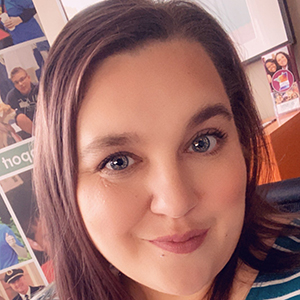 Guest post by Jillian Nelson, Community Resource and Policy Advocate, Autism Society of Minnesota
Guest post by Jillian Nelson, Community Resource and Policy Advocate, Autism Society of Minnesota
World Autism Day is my favorite holiday of the year. It always has come at the start of an exciting month and has been a day punctuated by autism-friendly events, interviews, and people everywhere talking about autism! In a world where I spend a lot of time trying to fit in, this day always has seemed magical. Every now and then, someone brings a cake, and that’s even better.
Last year COVID changed my perspective on World Autism Day. While it still is my favorite holiday, the meaning has changed significantly. When we remove the fanfare and the fun, we are forced to look into the deeper meaning of World Autism Day. This day exists because we still have so much work to do.
When I stepped out of the excitement and had to really examine the years before, there certainly were some cracks in the picture. The events I looked forward to were almost always aimed at autistic kids or fundraisers that didn’t consider sensory-friendly accessibility. The interviews and people talking about autism had to be redirected to consider the diversity of our community. The needs and perspectives of autistic adults were consistently ignored because the world seems to forget that autistic kids grow up. And far too much was focused on fundraising to find the cause and cure for autism.
So this leads us to a new question: what does World Autism Day look like in 2021 when I am instead celebrating from my home during a worldwide pandemic? It is a day of mixed emotions.
For me, it’s a day of gratitude for organizations like the Autism Society of Minnesota (AuSM), where I work. They saw potential in a quirky receptionist and figured out I would be much better suited to public policy. I worked with the AuSM team to build a department that allows me to shine while using my skills. Knowing that they see the same potential in the rest of my community and will continue to work tirelessly to improve the lives of people with autism and those that support us fills me with hope.
It’s a day to be thankful that I get to work with amazing groups like the Minnesota Council on Disability, Arc Minnesota, The Disability Law Center, and the Consortium for Citizens with Disabilities to make policy changes. These changes help me to see a future where people with autism live their chosen lives and where the government and state departments support those lives fully.
It’s a day to celebrate my autistic friends, both young and old, and rejoice in all the good they bring into my world. It’s time to truly value the beauty that is having a community with shared life experiences. It is also a day to embrace the parent and professional allies that join our community and help us advocate and support one another every day.
It also is a day to reflect.
To think back on all the moments of insisting on accommodations throughout the year and recognize the heaviness of fighting for the same access other people have. It’s a time to ponder how we get the world to start understanding invisible disabilities so that we can carry less fatigue from the fight.
It is a day to mourn members of our community lost to filicide or police violence, such as Kobe Heisler, Eric Parsa, and Alejandro Ripley. These are names that go unsaid far too often, even in a time where Say Their Name has become a constant echo.
It is a day to challenge spaces that aren’t made for people like me in hopes that someday things like sporting events, community celebrations, the Department of Motor Vehicles, or my local grocery store can be places that I can go without distress.
It is a day to scream from the mountain tops, begging the world to see all the beautiful shades of autism lost in spaces of intersectionality and to amplify voices of Black and Indigenous autistic people, who are too frequently silenced in both disability and racial justice conversations.
It is a day to open closet doors and demand neurodiverse acceptance for LGBTQIA people on the spectrum so that they can move without fear as their true selves.
It is a day that begins a month-long exhausting conversation between autistic adults and communities everywhere, as we beg them to listen to us and to stop demanding a cure for who we are. We don’t need to be cured; we just need to be seen, accepted, and appreciated.
You may wonder, with all the dark clouds: Why is World Autism Day still my favorite holiday? The answer is surprisingly simple. Because to me, it means hope. It means that there is still a lot of work to do, but if we keep showing up, if we keep educating, if we keep telling our stories and saying their names, things can get better.
This year I am challenging everyone reading this to make World Autism Day a day that goes beyond awareness and starts taking steps towards acceptance and change.
In the words of a long-time champion of our community, Paul Wellstone: “We all do better when we all do better,” and I believe that World Autism Day 2021 is a great time to start doing better.